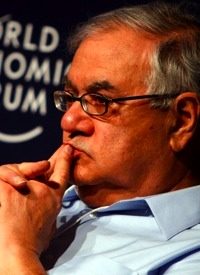
The annual meeting of the rich and super-rich at Davos, Switzerland, ended January 31 with the usual calls for greater empowerment of the United Nations, and for the working taxpayers of the world to fork over more money to fund more UN programs.
The effects of that gathering are already being seen in several summits (G7, Franco-German, Delhi) that have taken place in the days since Davos adjourned. The five-day World Economic Forum (WEF) — the annual confab of Presidents, Kings, and Billionaires — heard appeals to conclude a global warming agreement in 2010 to replace the Kyoto Protocol, create a United Nations Economic Council, commit more funding to the UN Millennium Development Goals, and levy a global "insurance" tax on banks.
Congressman Barney Frank (D-Mass.), Chairman of the House Financial Services Committee, was one of the speakers and panelists at the conference who addressed the issue of global banking regulation. Frank said, "There is general agreement that there has to be international coordination. But there’s no global sovereignty and no one is going to be able to impose any global rules." Meanwhile, Dominique Strauss-Kahn, head of the International Monetary Fund warned the United States and European countries against crafting separate approaches to bank regulation, urging governments to pursue global agreements instead.
"I’m worried about the possible inconsistency of different countries’ proposals," the IMF chief said in an interview. He also repeated his call for countries to keep up their massive government spending programs, saying a premature reduction of "economic stimulus" measures presents a graver threat to the economic recovery than the risks posed by enormous budget deficits.
German Chancellor Angela Merkel called for the forging of a new global economic charter, claiming that cooperation among international financial institutions has failed to protect the world against the worst financial crisis in decades. "This may even lead to a UN Economic Council, just as the Security Council was created after World War II," she told the WEF assembly. She also called on governments to take responsibility for their economies and flex greater control of the markets.
In addition to pushing for conclusion of a global climate change agreement, the WEF attendees also heard a lot about the supposed necessity of — and the great profits to be made in — government-favored "green" initiatives, such as Global e-Sustainability Initiative.
The 40th annual WEF, which ended on January 31, set the table for the Franco-German Summit on February 4, the Delhi Sustainable Development Summit February 5-7, the G7 Summit on February 8, and the upcoming UN Climate negotiations in Mexico, which will be starting soon, and culminating in yet another UN Climate Summit November 29-December 10 at the Mexican resort of Cancun.
French President Nicolas Sarkozy and German Chancellor Angela Merkel co-presided over the Franco-German Summit at the Elysee Palace in Paris on February 4, at the conclusion of which they issued a Joint Declaration.
Following the advice of the IMF’s Dominique Strauss-Kahn, they pledged to continue their "stimulus" spending, promising to ease up on the deficits by somewhere between 2013 and "the middle of the decade." The Declaration states:
[France and Germany] confirm their commitment to sustainable state finances within the stability and growth pact and [they] point out that the current excessive deficit situation should be ended by 2013: balanced budgets should be within reach by the middle of the decade.
President Sarkozy said: "We are affirming an extremely important political choice here, the will to make a success of the new global governance."
Related articles:
"Tobin Tax" and UN Global Taxman Making A Comeback
Global ObamaCare and World Population Control
Photo of Rep. Barney Frank at WEF: AP Images


